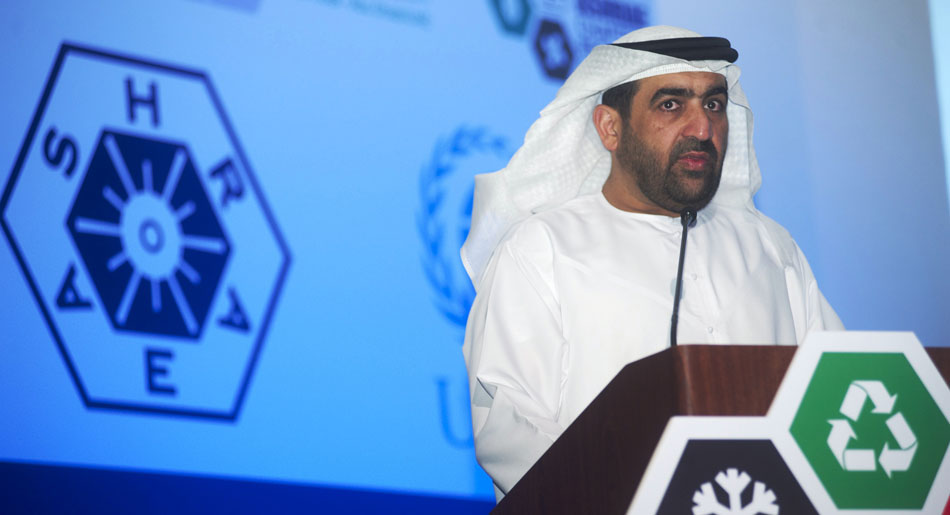Regional ASHRAE conference concludes with message that 'the world should go green before it is too late'.
 Other News
Other News Subscribe to newsletter
Subscribe to newsletter
| 22 Sep 2011 |
The Montreal Protocol was a key focus of discussions led by United Nations Environmental Programme (UNEP) officials and regional and international professionals who attend a key two-day ASHRAE (American Society of Refrigerating, Heating & Air-Conditioning Engineers) conference hosted in Abu Dhabi this week.
The ASHRAE Chapter Regional Conference, inaugurated by H.E. Dr. Rashid Ahmad Bin Fahad, the UAE Minister of Environment & Water and held under his patronage, lived up to its expectations as a key link to the feverish global discussions on HCFCs (Hydro Chloro Fluoro Carbons), which Dr. Adel Farid Abdel-Kader, Officer Of Charge of UNEP Regional Office for West Asia, described as being 2,000 times more potent than carbon dioxide.
H.E. Dr. Rashid Ahmad Bin Fahad said: “This conference focuses on sustainable topics like green buildings and efficiency in using energy and air-conditioning. This clearly shows the support by international associations to the policies of governments and private sectors to attain sustainable growth and fight climate change. These issues were always treated as critical in the UAE where there is a strong focus on transforming the economy to a green economy with less carbon emissions, and attain sustainable development in all sectors.”
The UAE in recent years has taken significant steps in green buildings and HH Sheikh Mohammed Bin Rashid Al Maktoum, UAE Vice President and Prime Minister and Ruler of Dubai has ordered to implement the standards of green buildings in Dubai emirate in 2008 and this was followed by Istidama initiative in Abu Dhabi.
Starting 2011, UAE government enforced a series of projects to implement green buildings at the federal level.
Bin Fahad added that UAE has adopted innovative solutions for conserving energy. He said that achieving sustainable development is a joint responsibility of the public and private sector where associations have a great role to play especially in the air-conditioning and chilling part, which should be a top priority because this sector consumes a great deal of energy that might reach 70 percent of the total energy consumed in buildings.”
Speaking of the key achievements of the Conference, its General Chair, Dr. Ahmed Alaa Eldin, said that the aim was to heed the clarion call of H.E. Dr. Rashid Ahmad Bin Fahad for greater involvement from ASHRAE in establishing standards and regulations to safeguard the environment.

H.E. Dr. Rashid Ahmad Bin Fahad, the UAE Minister of Environment & Water.
Dr Eldin, who is also President of the ASHRAE Falcon Chapter, said that the discussions that took place during the Conference would be amplified to a larger audience with the aim of attracting industry feedback on crucial issues. The Falcon Chapter, he added, would aim to keep the discussions alive, till such time that there was substantial progress on issues, out of which would emerge recommendations.
“The Minister said that it was not enough to address only ozone depletion but also how to reduce energy consumption,” Dr Eldin said. “To that effect, we will keep our efforts on and explore how to achieve the target through collaboration and discussion with key stakeholders within and outside the ASHRAE fold. Ultimately, we would like the discussions to contribute to Abu Dhabi’s grand 2030 Vision.”
The conference emphasized on the importance of continuing work on enhancing the use of energy and finding alternative materials to the materials used in chilling and conditioning and putting more efforts in research and development to transform the world to a green economy.
Dr. Abdel-Kader, also speaking on behalf of UN Secretary General, Ban Ki Moon, said the mission to phase out HCFCs remained incomplete, adding that more effort was needed to achieve the 2013 target of doing away with the refrigerant.
The UNEP official said that the phase-out actions so far had contributed to reducing the impact on the environment. Further actions, he added, represented a unique opportunity to achieve cutting-edge technology and lower energy costs.
To facilitate the transition, parties of the Montreal Protocol are considering further amendments, including bringing HFCs (Hydro Fluoro Carbons) under the Protocol. HFCs don’t affect the ozone layer but cause global warming. Keeping this in mind, efforts are on to leapfrog HFCs, wherever possible, and use refrigerants that have low ozone depletion potential as well as low global warming potential.
The Conference also saw a broad discussion on sustainability, with Abu Dhabi’s much-lauded Estidama and Masdar and Qatar’s sustainability standard, QSAS (Qatar Sustainability Assessment System) getting a fair bit of airing.
A key highlight of the Conference was an announcement by the CEO of EMPOWER, Ahmad Bin Shafar on the much-awaited ASHRAE design guidelines for district cooling. Bin Shafar said the guidelines would be released in November 2011, thus fulfilling a long-felt and critical need of the industry. EMPOWER has sponsored the important initiative.




